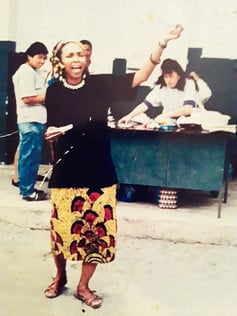Presented by Museum of the Peace Corps Experience and American University Museum
c. 1994–96
Pimampiro, Imbabura, Ecuador
Courtesy of Rosemarie Ricks, Ecuador, Pimampira 1994–96

I was born in the Republic of Panama and grew up speaking Spanish. In Ecuador I was assigned to an area where the fetal and childbirth mortality rates were extremely high. As an RN/CNM, this was a fantastic assignment.
The welcome mat was not obvious during my first weeks in Pimampiro. The local Catholic priest had cautioned the community that I was an evangelist. I decided to attend Mass, sat in the back row, and went to receive communion. The word spread and the priest became a friend. Many women came to the clinic for prenatal and postpartum care.
I traveled to outlying villages, such as Chalguaycua and Sanchipamba, and gave talks about sanitation, nutrition, and the impact of hygiene on health. I identified the local midwives and provided information that led to changes. Ultimately these efforts reduced infections in these communities.
I visited the Black community of Chuga whose residents were referred to as morenos and “lost people.” These were some of the most beautiful Black people I’ve ever seen. I was able to relocate the clinic from a hot, desolate, dirty spot of pavement to a more suitable site. The morenos came to see me in large numbers for pre- and postnatal visits.
Boosting self-esteem was important. I said, “You folks look like me. I’m not lost—and neither are you. In this community we have problems that we’re going to solve together.” Instead of drawing water where garbage accumulated, I told them to draw their water upstream and boil it. With simple measures, illnesses decreased.
Everywhere I went I talked about diet, washing hands, and basic sanitation. After a talk at a school in Pimampiro, a young boy followed me and said, “You told us boys have two eggs, but I have three—and one of them hurts.” He had a hernia, and I was able to arrange surgery for him.
I persuaded merchants to support health fairs in local schools. They were a huge success. I also was responsible for training and supervising 13 midwives. Over time fetal and maternal death rates began to decrease.
Besides my ability to speak Spanish, I enjoyed another advantage. As a Black American from Bedford-Stuyvesant in Brooklyn, I understood that poor people usually have to fight to get what they deserve. The Peace Corps didn’t teach me this. Life did.
The Committee for a Museum of the Peace Corps Experience is a 501(c)(3) private nonprofit organization. Tax ID: EIN # 93-1289853
The Museum is not affiliated with the U.S. Peace Corps and not acting on behalf of the U.S. Peace Corps.
Museum of the Peace Corps Experience © 2024. All Rights Reserved.